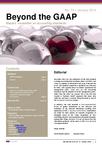
This standard represents a significant new direction for IFRSs, with a greater focus on entities’ operational risk management policy. From now on, the accounting treatment must be adapted to fit the management policy, rather than the other way around. This is the first step towards a “business model” approach that many have called for, and that is currently being discussed as part of the Conceptual Framework project.
In addition, the IASB launched a Post-Implementation Review to gather information on the relevance and usefulness of the financial information resulting from application of IFRS 3 - Business Combinations. Stakeholders are asked for their opinion on separate recognition of intangible assets at fair value, recognition of non-controlling interests, step acquisitions and partial disposals, among other things. However, it is not yet known how the information gathered will be used, as IFRS 3 is a US GAAP converged standard.
Highlights
IFRS Standards
- FAF to fund completion of joint FASB and IASB projects
- IASB launches post-implementation review of IFRS 3
- IFRS/US GAAP convergence on financial instruments seems unlikely following latest FASB decisions
- IASB approaching completion of IFRS 9 project
- IASB publishes interim standard on rate-regulated activities
A closer look
- Revision of hedge accounting under IFRS: publication of IFRS 9 final standard on general hedge accounting



